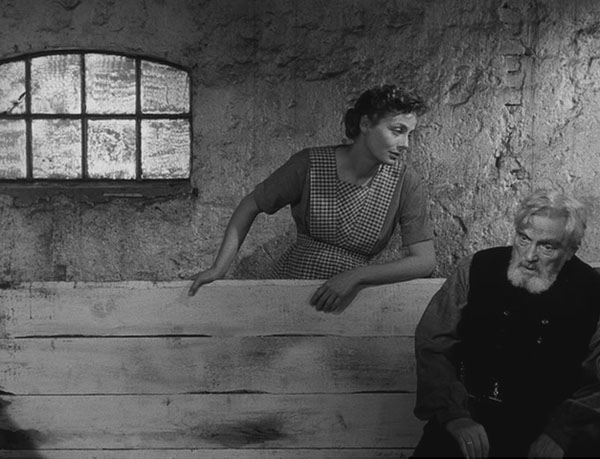Religion is a rich and varied subject for many filmmakers to pursue. Many filmmakers make at least one movie that explores the religious side of society. Sometimes these movies can be hard-hitting satires that point out the hypocrisy of religion. Other times, they can be small lyrical dramas about a person’s internal faith. But most filmmakers do not make their career subject matter the big r word. But most filmmakers aren’t like Th. Carl Dreyer.
Ordet is about two families in a remote part of Denmark. The Borgen family is led by Morten Borgen, a stout farmer who clearly etched out a unique life of his own. He has three sons. Mikkel, the eldest, is married to Inger and they have two children with one ready to burst out. Johannes is the middle one. He has gone mad some years ago after studying too much Kierkegaard and now believes he is Jesus Christ. The third brother, Anders, is a young adult who is in love with Anne, the tailor’s daughter. The other family is the tailor’s family, called the Petersens. The patriarch and proprietor of the business, Peter, is also a very devout fundamentalist Christian. The wife, Kirsten, staunchly stands next to her husband. Anne is the silent, but dutiful daughter.
The main conflict between these two families is Peter Petersen’s refusal to let Anne marry Anders. But this conflict doesn’t really matter. What matters more is Petersen and Borgen’s difference of religion. They are both Christians. Although they are united by one sacred text, their interpretations of this text vary wildly. Petersen is an austere fundamentalist, believing in the need for the sinner (which is everyone) to frequently ask for forgiveness and prostrate oneself in front of the Lord. We see the physical manifestation of his religion at a prayer meeting that he holds. The meeting is somber and full of fire and brimstone rhetoric. He is staunch and resolute in his beliefs. Borgen, however, believes in a joyous and forgiving God. He wants everyone to go to heaven not just the people of his own religion. He talks about religion and faith to Inger early on in the film and we can sense that he has some reservations about it. Although in his youth, he fought for a less strict faith in his community, we can see that this fight has gone out of him. He doubts his faith in God. These conversations that happen between Petersen and Borgen and Borgen and Inger make up most of the film. What is right? What is the perfect path to peace and happiness? No one ever has the answers, but that seems to be okay.
As the film progresses, the lives of these people shift dramatically. Inger is becoming sick from the pregnancy. She is failing fast and the doctor must get the baby out of her in order to save her. Their questions about abstract religion now become very real. Will the power of prayer save this beloved family member? Or will she die? At one point the doctor who is working on Inger sits down next to the priest who has come to visit. He asks a very important question. Did his work and his reliance on science, a very concrete discipline, save Inger? Or did the family’s persistent prayers save her instead and guide God to give the family a miracle? No one knows quite how to answer the question, because they don’t quite know. This is in essence the problem not just with religion, but with life itself. The doctor could have applied every aspect of science that he was taught to try to save her and there was still a strong possibility that she wouldn’t have lived. The world is made up of wild chances and harsh realities.
Of all the characters, it is easiest to sympathize with Inger. Inger has an internal faith that isn’t bound by a Church’s sense of rules. She prays out loud and has faith that prayer will help her brother-in-law, Johannes, become sane again. But she doesn’t force her faith onto her unbelieving husband. She accepts him for who he is and believes that one day he will find true peace, even if it isn’t in the religion she believes in. Her internal light seems to brighten even Morten Borgen. Her illness brings him back to prayer and the belief in his own religion.
Religion is a complicated subject to portray accurately on film. Most of the time characters with religion seem to be a cardboard cut out of very few characteristics. However, Dreyer was able to convey the complexity of religion while also grounding his characters in the reality of his world. The religion of their choosing is just one aspect of their many faceted lives. It is what drives them and completes them but it isn’t all that they are. More filmmakers need to remember that.
